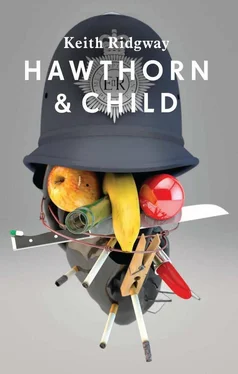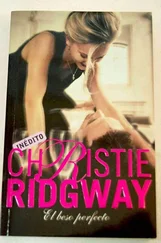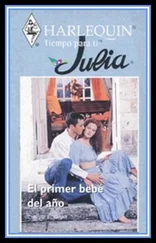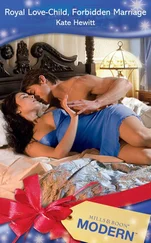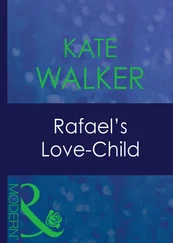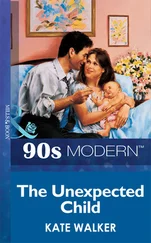The coffee shop was at a crossroads. She had to walk past it on the way home. Down the road from the school. Then the zebra crossing. One time she was walking past it and she glanced in and her dad was sitting there. He hadn’t seen her. He was reading a newspaper. She just looked at him. She was with a couple of people. Stuart and Byron and Felice. Or something. So she couldn’t really just stop. But she lingered. And looked at him. He was reading. Every so often he’d look up. But he was looking out towards the crossing. He’d missed her. He looked worried. He looked sad and worried and tired. He looked the way he always looked when he didn’t know she could see him. Then when he saw her he’d light up. Or — well, not light up, but his face changed. He would smile. And yeah, he’d brighten up a little. And she liked that. But his face when she wasn’t in front of him worried her. He sat slumped. He looked old. Older. Did he fake it when he saw her? Or did seeing her just make him happier than he really was? She didn’t like it either way. She caught up with the others. Later she got the text that he must have sent at 3.30. It had been lost somewhere. She replied immediately and he texted back saying it didn’t matter, it was no big deal, he’d just been passing. Love.
*
She and Stuart had sort-of-sex in his bedroom one Saturday afternoon. Everyone thought he was gay, and he never really cared one way or the other about that and never denied it or got angry or anything, so she had thought he was gay too. And he liked books and art, so … and he wore a scarf in a sort of gay way, and he was good friends with Byron, who was actually gay. But it turned out he wasn’t gay. Or wasn’t very gay anyway. He was a really good kisser. Kissing him was … really good. She talked to Beth about it, and she had wanted to describe what the kissing was like; and she wanted to tell her that kissing Stuart was like being inside a Jackson Pollock painting. She really wanted to say that. She was determined to say that. But when it came to it she just said that it was really good , and bare sexy . It made her think that maybe Beth and her weren’t as close as she thought. Because why else would she not say what she wanted to say? It was just stupid.
Stuart talked to her about art. She knew more than he did. He seemed interested in listening to her. He sent her an email saying he’d looked up Francis Bacon online and thought he was mad and brilliant. But she thought he was faking it a bit. And it was the first she’d heard from him since the sort-of-sex, and he didn’t mention that at all, or her really either, or mention anything about meeting up again outside school or whatever. He had film posters on his wall. Watchmen and Superbad , and an old Finding Nemo one that she thought was cute but which made him blush when she mentioned it.
When he took off his jeans she saw a big scar on his leg. Just above his knee, on the back of his leg. She wanted to know what it was, but she didn’t ask.
She read about horrible things in the newspapers. She read about fathers who killed their kids because they hated their ex-wives. They strangled them or poisoned them or drove them off a cliff. She read that stuff all the time. Just when she had forgotten about one case, a new one would turn up. Or she’d hear about them on the TV or the radio. Her mother always went dead quiet when stuff like that came on. And sometimes she’d mutter something. Something like the poor things, or what a bastard. And Cath would think about her father. About him slouched over his coffee without her. She could scare herself for a short while thinking like that. But not for very long. Her father was very gentle. Very kind. He had never smacked her, even when she was little and screamed all the time. Her mother had smacked her. He’d never even shouted at her. Or not that she could remember. Or not in a way that made her remember. He was always gentle. He would say nothing, just open his arms, and she would lie against him and he would wrap her up and she would stay like that for ages. That was when she was little. They hadn’t done that in a long time. But she would do that again without even thinking.
She wanted to ask him whether he had ever had a case like that. A father who kills his kids. Or anything like that. But he never told her any of the bad stuff. She knew he had to investigate all sort of things — murders and everything. She’d seen him on the news once. The London news. Detective Inspector Mark Rivers. It was weird, seeing his name like that. And him asking for witnesses after a boy was stabbed somewhere. He’d been really good. He talked about the boy like he’d known him, about his family and stuff. It was all good — the way people are after they’re dead. It had made her nearly cry, because she was proud of him she supposed. But he only ever told her about the funny stuff. Or he made it up.
— No, Dad, that’s Pollock.
— Watch your language.
She laughed.
— Pollock. Jackson Pollock. He does the ones with the paint all over the place all scrambled and splattered and stuff.
— Do you like them?
— Yeah.
— Not so much though?
— Well, I like them. They’re fun. I’d like to see them for real, because the paint is meant to be really thick and that would be amazing to see them up close. But they’re like …
— A mess.
— No. They’re like the idea of having an idea, instead of having an idea.
She laughed at herself. Her Dad made an ooh noise. They turned a corner.
— Is that art teacher of yours any good?
— Yeah, she’s OK.
— Are you smarter than her?
She laughed, thinking yes!
— No.
— Have you told her you want to go to art college?
— I don’t know if I want to go to art college.
— Oh. I thought you did.
— Well I want to do art, but I don’t know if I want to go to art college or do art history. First.
— First?
— Maybe.
— Well. No hurry.
He pulled in to the kerb in front of the house. She leaned across and kissed him. She knew he wanted a hug. But it was awkward, hugging in the car, and she didn’t like it.
— Will you call me during the week?
— Yes.
— How’s your mother?
He always left it to the last minute. So that she could only say
— She’s fine.
— OK. I love you.
— I love you too.
— Speak soon.
He waited for her to get to the front door. As if something might happen to her between the car and the house. Then when she put her key in the lock he drove off, as if nothing could happen to her then until the next time.
*
She liked Tracey Emin, even though everyone else she knew didn’t like her, and some people seemed to hate her. She liked her voice best of all, and she loved to hear her talk. She saw her once, walking through Smithfield Market looking really hung over. She’d wanted to talk to her, but she’d been too shy, and her friend Michele didn’t know who she was and there was no one else to be excited with. She didn’t like Damien Hirst at all. She thought he was an idiot. And his work was ugly and full of boyish things, like he was a permanently horny boy trying to get some, and everyone was just embarrassed to have him around. She thought Sarah Lucas was like that too. But she didn’t say it. She just said that Lucas didn’t really move her. It was a way she had of dismissing something without sounding judgemental. She had learned it from a documentary about Francis Bacon. She couldn’t remember now whether it was Bacon who said it about some other artist, with a smirk on his face, or whether it was someone else who’d said it about Bacon. She liked Jake and Dinos Chapman. She liked the way they could make her feel a bit sick, but that she kept on peering at their models and their pictures anyway because all the detail had something in it that was important but it kept on shifting somewhere else, like when you have a floater in your eye. She liked Grayson Perry. She liked his voice too, and she liked hearing him talk about art, and she had some podcasts of a radio show he’d done. But she didn’t really know his art. She liked the way he shocked her mother whenever he turned up on the telly in one of his mad frocks. She’d been to the Turner Prize exhibition for the last three years. She had liked Zarina Bhimji most in 2007. In 2008 her favourite was either the photographer, or Goshka Macuga’s wooden things like people trees. In 2009 she hadn’t really liked any of them. They didn’t move her.
Читать дальше
